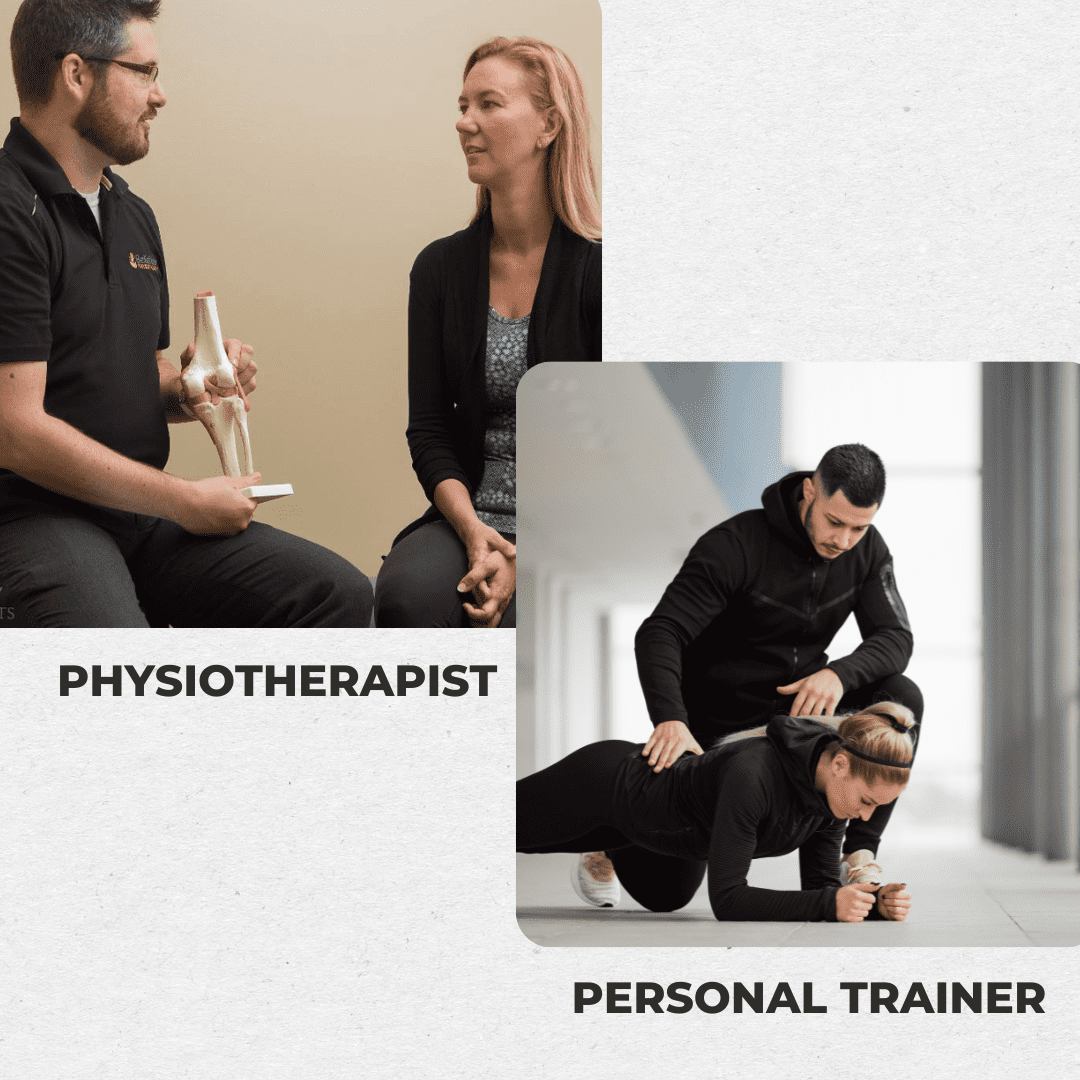
Personal Trainer vs Physiotherapist.
Physiotherapist vs Personal Trainer.
As a physiotherapy company, we often have a Personal Trainer and Physiotherapist working together. As a result, we are often asked the difference between these 2 experts. Both professions are very important to the wellbeing of an individual, as they can give you the tools and support that you need to reach a health and/or fitness goal. They can provide support, accountability, education, and a personalized plan of attack, so you may find working with one well worth the investment.
So, what is the difference then? The difference is in their purpose.
Physiotherapist
A physiotherapist is a regulated healthcare professional in Canada, much like physicians, dentists and other specialists. Becoming a physiotherapist in Canada requires a professional Master’s degree from a recognized university. After obtaining this degree, a graduate becomes eligible to write the Physiotherapy Competency Examination, which is usually a requirement in order to become a registered, working physiotherapist.
Physiotherapists receive a very in-depth medical education and training and they are able to assess, diagnosis, treat and manage acute and chronic conditions, as well as the prevention of injury and disability, and promote the health and wellbeing of their clients.
You often see physiotherapists working with people in one-on-one or group-based settings. They also provide treatment in various health care settings including: hospitals, long-term care facilities, home care, community-based clinics, schools, private practice clinics, and primary care networks.
The goal of physiotherapy is to restore, maintain, and make the most of a client’s mobility, function, and well-being. You would see a physiotherapist to treat an injury, impairment, body mechanic limitation, disability, acute and chronic pain.
You should see a physiotherapist for the following reasons:
• Prevent an injury or re-injury
• Alleviate pains or flare-ups from injuries, incontinence, dizziness, vertigo, and other balance issues
• Manage a disease or physical limitation
• Recover from a surgery
Personal Trainer
Personal trainers often receive a certification from a certifying fitness institution with training in anatomy, physiology, biomechanics, nutrition, human behavior, and other key topics. They are a fitness professional that helps people with a medical clearance to exercise to identify their personal health and fitness goals, designs exercise and fitness programs, and educates and motivates people to help them to safely and effectively reach their health and fitness goals.
Personal trainers are excellent resources for beginners who need help getting started as well as for more seasoned exercisers who want to push themselves further. Working with a personal trainer can be the perfect transition in a client’s recovery post-physiotherapy. Instead of going straight from the physiotherapy clinic trying to return to an active lifestyle (whether this may be everyday activities or a return to sport/exercise), a personal trainer may provide all the information, knowledge, and tools to progress in the client’s stage of recovery.
You should see a personal trainer for the following reasons:
• Suggest physical activities that work for your body, schedule, and available equipment
• Show you how to choose exercises, weights, reps, and sets
• Keep you motivated to exercise and develop a plan
• Teach you how to get the most out of your workouts
• Offer a new perspective if you are not reaching your fitness goals
• Work around an injury and/or physical limitation
How to choose between a Personal Trainer or a Physiotherapist?
As you have read, both physiotherapists and personal trainers work to build up the strength and fitness of their clients. The key differences between the professions are their education, area of practice, and overall health care focus.
If an injury or surgery is limiting your ability to achieve your health and fitness goals, then a physiotherapist will be the right professional for you. They will educate you on your limitations, why they are happening and provide you with a plan of care to overcome these limitations.
If your goal is to improve your overall health and wellbeing, and have no major injuries or recovering from surgery, then a personal trainer would be a great option. They will help design a fitness plan with you to achieve your goals, all the while educating you on choice of activity, resistance, intensity and frequency.
If you would like to speak with a physiotherapist, click on the yellow button below the text. If you would like to try out a session with a personal trainer, please complete the form at the bottom of our Personal Training page. We always offer a free, no obligation 30 minute consultation with a Personal Trainer to discuss your goals and how we can assist you in achieving them.
We are happy to put you in touch with the correct professional to achieve your specific goals.







